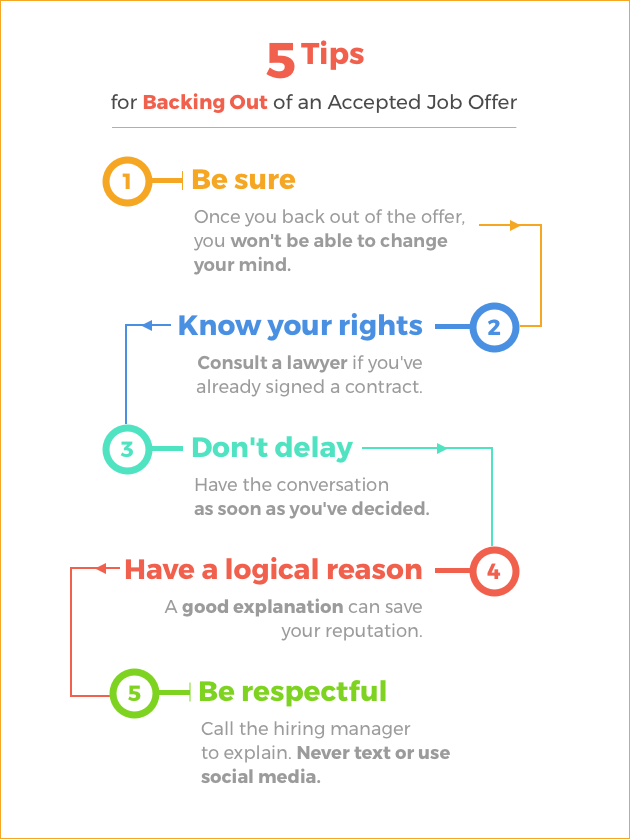5 Tips for How to Back Out of a Job You Accepted
You know how to build a resume, you killed it at the job interview, and you’ve accepted a job offer from a new employer, but before your first day on the job, you decide that you don’t want the position after all. So how do you back out of a job you accepted?
We’ve gathered five tips to teach you how to do it the right way.
1) Are you sure you want to back out of a job you accepted?
Most people struggle to get a job offer – any job offer – so discarding one shouldn’t be taken lightly. And you probably aren’t doing that, judging by the fact that you’re reading this article.
But before taking any action, you need to be sure that you really do want to learn how to back out of a job you accepted because there’s no going back if you make a mistake. While a jobseeker who is feeling rejected might decide to freeze a job search until they’re feeling better, a rejected company can’t afford to do that. They’ll need to find someone else to fill the role.
That said, this scenario does present itself now and then. Sometimes, when you buy an expensive item you can experience cognitive dissonance – sometimes referred to as buyer’s remorse – people can sometimes feel uneasy about whether you’ve made the right choice when it comes to a job offer. If you feel strongly that the job or the employer is not a good fit for you, then you need to rescind your acceptance of the job offer.
If you rescind and begin looking for new jobs, create a resume or update an existing resume with our easy-to-use Resume Builder. You’ll find professionally designed resume templates to choose from, plus pre-written bullet points to add, that really speed the writing process along.
2) Will it cause any legal headaches to back out of a job you accepted?
Often, a new employer will have you sign a contract on your first day on the job, but it also isn’t unusual to be asked to sign an agreement as part of accepting an offer.
Ideally, you would decide to figure out how to back out of a job you accepted before you’ve signed anything. If that’s not the case, read your contract very carefully to make sure that backing out won’t come with any strings attached or any legal repercussions. If so, you might need to find out how to extricate yourself.
For example, it’s not unheard of for companies, especially startups, to make candidates sign non-disclosure agreements (NDAs) with their contracts or even earlier during the recruitment process.
While it’s not convenient for the company if you change your mind, organizations want to hire people who want to be there. However, depending on the circumstances and the people involved, they could try to scare you into coming on board anyway. If you’re concerned, consult an employment lawyer before rejecting the job offer.
3) When should you tell the employer?
One of the hardest things about a job search is waiting for a response from employers, right? It would be so much easier if every application received an immediate response so you could quickly decide whether you should move on. Similarly, the employer you plan to reject will want to know ASAP if you plan to back out of a job you’ve already accepted and they need to move on from you.
Any rejection will lead to disappointment, but the longer you wait and the closer you get to your first day on the job, the more difficult it will become to figure out how to back out of a position you accepted and the greater the disappointment for the employer.
On the one hand, it’s easy to justify “treating others as you’d like to be treated,” and rush off to tell the employer you plan to back out of a job you’ve accepted immediately. However, if declining the accepted offer is in any way conditional – such as the possibility of getting an offer from another company – then you should wait as long as you can before acting.
That said if your decision is final and you plan to back out of the accepted job offer regardless, tell the employer as early as possible.
4) What should you tell the employer?
Before you decide how to back out of a job you accepted, you must be clear on the reasons why you are backing out.
You aren’t required to give a reason why you’re backing out of a job you accepted, but the recruiter or hiring manager will undoubtedly ask. Being able to provide a valid explanation could soften the blow.
Don’t give a petty reason, as that will only add insult to injury. If the reason you plan to back out of an accepted job offer is legitimate – like a change in family circumstances or a health issue, for example – the employer is more likely to be understanding. When considering how to back out of a job you accepted, being able to provide a logical reason for your decision is your best bet if you’d like to avoid burning any bridges.
Either way, express your appreciation for the job offer, and for the confidence the company showed in you. Thank those you’ve interviewed with for the time spent with you, and inform them that you’ve had a change of heart and have to rescind your acceptance and decline the offer.
You can even recommend to put them in touch with an alternative candidate if you know someone qualified that you think would be a good fit in your place.
5) How should you tell the employer?
If you can, call the recruiter or hiring manager and speak to them directly. It might not be easy, but it shows more respect than sending an email. Never back out of a job offer you accepted through social media, and never publicize it after the fact either!
If the entire recruitment process has been conducted over email, such as for a remote working position, it would be okay to continue with email, although calling would show that you were willing to go above and beyond even until the end.
It isn’t easy to back out of a job you accepted but it isn’t impossible either. Once the conversation is done, you’ll feel better and it will once again for time to start applying for jobs that you feel will be a better fit for you. Review your resume, make sure it is personalized to the job ads that most appeal to you, and another offer will come your way in no time.
Get the right job offer by learning to write your resume the right way. Don’t know how? LiveCareer can help.







